Jan 5, 2023
By Tim Deveney, Precious Blood Volunteers Director
I have traveled a fair bit during the last 18 years, so I have my packing routine down pretty well. I have different routines for different types of trips. When I pack for recruiting trips to college campuses, I pack pants, button-down shirts, a dressy pair of shoes, and ties for when I’m feeling a bit saucy. If I’m heading to Chicago to visit our volunteers, I’m more of a nice shirt and jeans type of guy. I know to check the weather in every destination I’m going to. It always amazes me how different the weather can be between Chicago and South Bend.
Traveling requires me to think through some of the possible contingencies. Where do I stay that is both comfortable and responsible with the resources the United States Province trusts me with? What’s the best route? Do I really want to pay the tolls to get to Notre Dame, or should I take an extra half-hour on the road to avoid the tolls? Should I rent a car or trust my skills in navigating public transportation? Do I have child care for my kids in the mornings before school? How am I going to get to and from the airport? (Thanks to my mother-in-law and father-in-law for regularly taking care of those last two items.)
Even with all the planning, there is a lot I cannot control. The traffic in Chicago is always a wild card. The places I stay might not be comfortable or quiet (There’s a loud rooster that lived near our volunteers in the Back of the Yards neighborhood in Chicago!). There are usually some unique experiences, sights to see, or new food. I learned about the glory of kolaches thanks to former volunteer Lina Guerrero’s parents in Austin, Texas. I have met some amazing people, some of whom I now count as confidants and friends.
Sometimes there are unexpected difficulties that come up. There are times when I feel tired and have to force myself to take that next step. I have been to recruiting fairs that no students show up to, leaving me with two to four hours of thinking about all the other work I have to do and the burden that my family is bearing because I’m traveling. At visits to our placement sites, I have to have unexpectedly difficult conversations with our volunteers or our placement contacts. Those conversations occasionally involve me having to dive really deep into how I am working with those people.
In November, I traveled to Florida for the Catholic Volunteer Network annual conference. It was our first in-person meeting since 2019. During the conference, one of the participants shared the poem “For Those Who Have Far to Travel” by Jan Richardson during an opening prayer. It’s a meditation on the journey of the Magi. It offered me a much different perspective on the journey the wise men took. She opens her poem:
If you could see
the journey whole,
you might never
undertake it,
might never dare
the first step
that propels you
from the place
you have known
toward the place
you know not.
The story of the Epiphany only appears in Matthew’s Gospel. The “wise men from the East” only appear briefly in Matthew’s infancy narrative. The author of Matthew’s Gospel gives them only two more sentences than Joseph, whose silence makes the wise men seem verbose. The unnumbered group undertakes a journey whose destination they do not know.
 They appear in Jerusalem to get directions. When they arrive in Bethlehem, they give their gifts to Jesus and offer him homage. They renege on their promise to Herod after having dreams in which angels warn them Herod’s intentions are not good. They end up going home a different way. They are a group of people who appear quietly in Matthew’s Gospel, and after giving their gifts and offering homage to Jesus, they just as quietly disappear.
They appear in Jerusalem to get directions. When they arrive in Bethlehem, they give their gifts to Jesus and offer him homage. They renege on their promise to Herod after having dreams in which angels warn them Herod’s intentions are not good. They end up going home a different way. They are a group of people who appear quietly in Matthew’s Gospel, and after giving their gifts and offering homage to Jesus, they just as quietly disappear.
What was their journey like? What did they pack? What new foods did they taste? Who were the people (besides those in Herod’s court and the Holy Family) they met on their journey?
How did they feel on their journey home? Did they feel the exhilaration of getting a glimpse of God’s love, or did they feel let down that God’s glory was in a child born to a young peasant woman and a carpenter instead of in a palace? Were their lives changed by their journey and those they met at their destination? How did they push through when they were tired, thirsty, or hungry?
We are all on journeys, maybe not as profound as the wise men, but journeys nonetheless. Our community is on a journey of discernment and discovery of how we are to witness Christ’s reconciliation in the world. Ultimately, this is a journey of love, inspired by the love of a God who gave us his Son to bring peace, mercy, justice, and truth. The road is hard, but like the wise men, we need to continue on even if we do not know the steps ahead of us. We probably do not even know the place we are going to! Throughout it all, we need to trust the slow work of God and be open to God’s love being revealed to us in unusual ways.
Tim Deveney is the director of Precious Blood Volunteers. Go to preciousbloodvolunteers.org to learn more about Precious Blood Volunteers.
This article originally appeared in the January 2023 edition of “The New Wine Press.”
Excerpt from “For Those Who Have Far to Travel” © Jan Richardson from Circle of Grace: A Book of Blessings for the Seasons. Used by permission. janrichardson.com
Sep 8, 2022
by Fr. Joe Nassal, C.PP.S.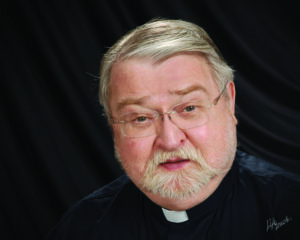
Minister of the Word
On the morning of July 1, 2022, the Feast of the Precious Blood, Alan Hartway wrote, “Today the Missionaries of the Precious Blood rejoice in the mystical wine from the garden of En-Gedi that becomes for us the Blood of Jesus, which animates our community to understand deeply the value of human blood and life in the view of the Father Creator.”
Sometime that evening, Alan died of a heart attack. It is significant that Alan died on our feast day because he was passionate and committed to our charism of proclaiming reconciliation and renewal in the blood of Christ through the ministry of the Word.
Alan had a deep love for scripture and for language. He brought these gifts together in his blog “Vineyards of En-Gedi: Homiletic Explorations into Communion, Community, and Evangelization.” Alan was a brilliant linguist. He knew Greek and could give a detailed explanation to the meaning and context of the scriptures, which enhanced his ministry of the Word. He also had a facility for languages, and for several years, he celebrated Mass in Spanish while also preaching for Unbound. Tim Deveney, director of Precious Blood Volunteers who once worked for Unbound scheduling preachers around the country, told me the staff at Unbound would always look forward to hearing Alan’s recap of his weekend assignment. His review often included colorful highlights of people he met, rectories where he stayed, or incidents that left Tim and the staff in stitches.
No doubt some of his stories were embellished to some degree. Alan took liberal license in his storytelling, believing facts should never get in the way of a good tale! Not that the stories weren’t true. Alan just made a distinction between true stories and truth stories! He enjoyed holding an audience, whether it was the congregation at Mass or students in a classroom, captivated and engaged with details only Alan could deliver.
A Creative Pastor
Alan’s sense of humor, his bible study groups, and his preaching made him popular with his parishioners. On the 40th anniversary of his ordination, Alan penned a letter to the people of Guardian Angels Parish in Mead, Colorado, where he was pastor at the time.
“I largely see the pastoral role as one of being an animator who nudges, pushes, pulls, coddles, enables, encourages, promotes collaboration at every level,” he wrote. “Part of this work is to be the mediator, to bring otherwise distant people together in new ways.”
When he was pastor at St. Mary’s Church in Garden City, Kansas, there was a woman in the parish whose faith and truth-telling he admired. Alan considered her prophetic—not in the sense of seeing visions but rather in speaking truth to power. She was not afraid to tell him the truth, so he invited her to serve on the parish council as the prophetic voice to keep the leadership of the parish grounded in the vision of Vatican II. Alan was deeply committed to the renewal of the church initiated by Saint Pope John XXIII. This, too, is embedded in the charism of our congregation and explicit in the vision of our becoming a new creation as one province of Missionaries and Companions in the United States.
Because of his intellect and his size, Alan was an imposing figure. He could be intimidating. But he welcomed and appreciated those who would stand up to him. He relished a good conversation on important issues confronting the church, community, and society. Of course, his linguistic skills were not only capable of building up but also of tearing down. If you dared to enter a verbal squabble with Alan, you had better wear full body armor because as Cher once famously sang, “Words are like weapons; they wound sometimes.”
He was not afraid to preach about social issues from the perspective of scriptures and Catholic Social Teaching. In the description of his blog, Alan quoted philosopher Reinhold Niebuhr’s famous advice that a preacher should preach “with the Bible in one hand and the newspaper in the other.” One of the more memorable examples of this is when he was pastor at Garden City. An epidemic of gun violence was plaguing the city, so one weekend at all the Sunday Masses, he invited parishioners to bring their guns the following weekend and hand them in to be destroyed. During an altar call that next weekend, several people came forward to relinquish their weapons.
Love for Community
In the last reflection for his blog, Alan wrote: “Life has value for us because it is not about the money, but about relationship.”
Alan loved the community. He was a member of the faculty at Naropa University in Boulder and later was pastor at Guardian Angels in Mead. As a member of the first graduating class at Precious Blood Seminary in Liberty, he wore that distinction proudly.
In February 2020, at one of the last gatherings of the members of the Kansas City Province at our Renewal Center in Liberty, Alan reminded us that he entered Precious Blood Seminary as a freshman in 1963, two years before the American Province was divided into three in 1965 and the Kansas City Province was born. So, when he entered the high school seminary, he was a student for the American Province. Now he will also be remembered as the first member of the newly formed United States Province to die.
In his first assignment, Alan served the community as a teacher and director of seminarians at Precious Blood Seminary. He later was director of formation and director of publications for the former Kansas City Province. For several years, he also coordinated our Provincial Assemblies. He was the coordinator of the Assembly celebrating the 25th anniversary of the province in 1990, and he asked me to write the words of a song to celebrate it. On the day he died, in the closing paragraph of the final reflection of his blog, he referenced the “Song of Liberation”: “In our community hymns we sing of being marked and called by the blood of Christ.”
An Excellent Teacher and Chef
Whether he was instructing high school students at his alma mater, graduate students at Naropa, or adult faith formation classes in parishes where he served, Alan was passionate about education, about expanding hearts and minds. He was especially proud of his time at Naropa, when he was the only Catholic priest teaching at the Buddhist-sponsored university. The study of and the search for common ground among world religious was a ministry of reconciliation for Alan. What can we learn from one another? He had a great reverence for other religious traditions, especially Buddhism, even as he was committed to Catholicism. He understood and practiced the true meaning of “catholic” as universal.
Alan not only feasted on God’s Word but also enjoyed preparing a feast for his friends. The table became a symbol of Alan’s view of how to live in the world. Hospitality, another important quality of the charism of our community, was important to him. There was always room at the table for honest dialogue and the exchange of ideas. He believed placing good food and fine wine in front of people begins to break down barriers.
As a gourmet cook, he loved trying new recipes. Most, like the “tur-duc-ken” (turkey, duck, and chicken stuffed together) he made for Thanksgiving or his beef Wellington, became legendary. But every now and then, his use of spices would cause diners to consume ample glasses of water to put out the fire. One such meal he made with curry when four of us gathered at Estes Park. While Alan was getting something from the kitchen, one of our friends quietly passed grape jelly under the table to cut the curry and calm the fire in our mouths and stomachs.
For several years when Alan was pastor at Garden City, we would vacation in Estes Park. Good friends of his at the parish had a cabin on the Big Thompson River. As I wrote or read on the porch, Alan would be in the kitchen, listening to NPR and preparing a memorable meal. Now Alan finds a place at the table on God’s holy mountain that one of his favorite prophets, Isaiah, envisioned—a table where the Lord of the Feast has prepared a delicious banquet of rich food and fine wines. Oh, the stories that will be told around that table!
So, rest in peace and enjoy the feast, Alan. May the joy of the kingdom you preached and wrote about often be even better than you imagined.
May 10, 2022
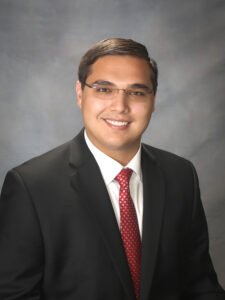
2021-2022 Precious Blood Volunteer, Aaron Wise
By Aaron Wise, Precious Blood Volunteer
I called her name. She rose slowly from her chair in the waiting room and hobbled toward me. She gifted me an enthusiastic greeting and a labored smile, that which is socially expected for decency. We entered the exam room, and I initiated the pre-provider tasks: taking vitals, gathering medical and family histories, conducting necessary point-of-care testing, etc.
Something appeared off.
Clearly, something deeper ailed my patient. I asked about her day, her holiday plans, her family. I found out the upcoming Thanksgiving would be difficult for her—the first one since losing her daughter. I asked about her daughter. I experienced my sister in Christ’s delight in sharing the memories of someone she loved so dearly. She showed me a beautiful, goofy video of her with her daughter—singing, dancing, and laughing. She teared up, a paradoxical moment of sadness and joy. Her heart was broken; from it oozed the Precious Blood, a combination of both suffering and pure love.
***************
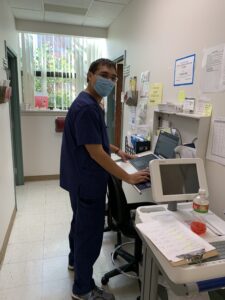
Aaron Wise, at work at KC CARE Health Center
Small drops of blood discolored the white floor. The patient had stepped on a nail in his garage, leaving a small, deep hole in his foot. I cleaned and wrapped the wound, yet this man had little concern for his foot.
He feared for his mind. He told me he wasn’t right—that something was wrong with his brain, that he was “messed up” in the head. He told me he’d done many drugs and other substances. He’d seen psychiatrists and been given many medications meant to help. None of them worked. He told me he would try one more thing, and if that didn’t work, he had “other arrangements” to take care of it.
I don’t know what this man has been through in the past. I don’t know what he is going through in the present. But I do know the life of my brother in Christ means something. He has an indelible dignity, despite the ways in which the world, those around him and he, himself, asserts that he is “messed up.”
***************
It was 2:30 on a warm Saturday afternoon. I was driving home with two friends along Independence Avenue, a busy road in Northeast Kansas City. On a patch of grass between the sidewalk and the road was a body—just yards from my residence.
I didn’t see it initially, but my friend insisted we return to check. People walked along the sidewalk, past the body. Several cars passed. From a distance, I got a better view of the man. His hat was thrown to the side, his body disheveled and uncomfortably positioned. One arm was raised and yellow. It was clear my brother in Christ was not breathing.
As we approached, a lady called out from a car to inform us she had called 911. Later, she revealed she had driven by 20 minutes prior, on a delivery. She was appalled by the indifference of hundreds of people who must have witnessed a man unwell on the side of the road. A life had passed—and nobody cared to notice.
***************
thud, thud, thud, thud, thud! It was midnight. I awoke to a cacophonous banging on our door and windows. We answered. Our neighbor frantically reported the house next to ours was on fire. We raced to the other window to witness the entire west side of the building engulfed in flames.
***************
These are but four brief stories among hundreds I’ve experienced working at the KC CARE Health Center in midtown and living in Northeast Kansas City. Interestingly, a few similar connections underly each of these stories and the many others that remain untold.
First, socioeconomic and racial barriers underpin each situation—access to health care, racism and discrimination, mental health stigmas, or scummy landlords who neglect their responsibility to respond to electrical issues. These injustices fall harder on minorities and those with less money.
Second, suffering seems to be part of the human condition. There is nothing the individuals in these stories could have done to prevent their hardship. I don’t say this ignoring the role of free will. Yes, each individual may have made choices that contributed to their situations, but the options they had available were severely screened by culture and society, among several other determinants.
Finally, God is present deeply with those who suffer. These are truths we recognize profoundly in the spirituality of the Precious Blood.
CS Lewis affirmed that heaven is an acquired taste. Jesus is my savior, and it is by His doings—not my own—that I will experience eternal life in union with God. Yet, if you were to bring me to heaven right now, I do not know if I’d like it. I still carry the taste of the world with me: pride, independence, self-servitude, sin. This contrasts with the purity and fullness of love that is heaven. However, through service and the experiences like those shared above, I’ve begun to acquire the taste of Christ. Community, simplicity, and prayer also have been formative for me during the past year.
I’ve practiced community on two levels this year: directly with those with whom I live and also with the global community.
I live with 18 others, including two families with five children, and sharing life with them has been a beautiful joy. I experience this joy in the form of sharing meals, interests, events, and time. I have countless jubilant memories such as tennis, basketball, soccer, football, Frisbee, ice skating (I love sports), faith sharing, music, etc.
In terms of the wider community, we focus on conservation, being involved in neighborhood and city policies, and living on a smaller income. Some of the practical aspects of this lifestyle are eating a vegetarian diet, consuming less water and electricity, composting, using a clothesline, paying attention to consumables and reusing when appropriate, and purchasing natural organic local products when available. There is a richness to sharing resources and life in this way.
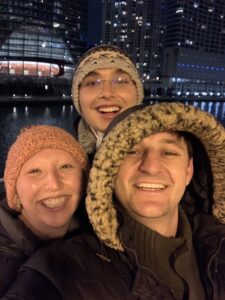
Aaron with his fellow Precious Blood Volunteers in Chicago
Simplicity is a challenging ideal when we live in a chaotic world. Despite this, I still have been able to find simplicity relative to my previous student lifestyle. I live in a house without Wi-Fi and a phone signal because I strive to remove unnecessary and empty lifestyle choices. Often when we think about simplicity, we focus on what we “give up” and an image of emptiness is invoked. In practice, it is quite the opposite! Removing the superficial and unimportant gives way to a spirit of great abundance—especially in time, relationships and charity.
Finally, prayer is the cornerstone that links everything. My relationship with God has strengthened me to participate and grow in all the ways discussed and also has been strengthened through my experiences. Daily Mass is a joyous gift and receiving the Eucharist has been fuller and more transformative through walking with others as a Precious Blood volunteer.
This year has been formative as I’ve taken little steps along a lifelong journey to acquire the taste of heaven. I invite all of you to join in along the way. As echoed at Jerusalem Farm: The way is long, let us walk together; the way is hard, let us help one another; the way is Christ, Christ is the way.
Aaron served as a Precious Blood Volunteer at KC CARE Health Center in Kansas City, Missouri. Go to preciousbloodvolunteers.org to learn more about Precious Blood Volunteers.
Apr 2, 2022
Reflections from the 2021-2022 Precious Blood Volunteers
Abundance Fills the Soul When Excess Is Stripped Away
May 10, 2022

2021-2022 Precious Blood Volunteer, Aaron Wise
By Aaron Wise, Precious Blood Volunteer
I called her name. She rose slowly from her chair in the waiting room and hobbled toward me. She gifted me an enthusiastic greeting and a labored smile, that which is socially expected for decency. We entered the exam room, and I initiated the pre-provider tasks: taking vitals, gathering medical and family histories, conducting necessary point-of-care testing, etc.
Something appeared off.
Clearly, something deeper ailed my patient. I asked about her day, her holiday plans, her family. I found out the upcoming Thanksgiving would be difficult for her—the first one since losing her daughter. I asked about her daughter. I experienced my sister in Christ’s delight in sharing the memories of someone she loved so dearly. She showed me a beautiful, goofy video of her with her daughter—singing, dancing, and laughing. She teared up, a paradoxical moment of sadness and joy. Her heart was broken; from it oozed the Precious Blood, a combination of both suffering and pure love.
Read more of Aaron’s reflection at https://preciousbloodkc.org/abundance-fills-the-soul-when-excess-is-stripped-away/
Accompaniment
Apr 4, 2022
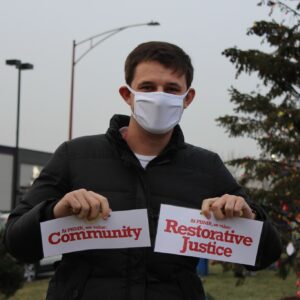 by Vincent Tedford, Precious Blood Volunteer
by Vincent Tedford, Precious Blood Volunteer
Last year, I was meditating on Christ’s Passion. Christ’s sacrifice and suffering were a focal point for all my emotions surrounding the injustices I witnessed in the world around me. Nothing else evoked the same emotion for me. However, when I became a Precious Blood Volunteer, I witnessed human suffering on a scale like never before.
In August of last year, I moved to Chicago’s Back of the Yards neighborhood to begin volunteering at the Precious Blood Ministry of Reconciliation (PBMR). Within a few hours of landing, I met and heard the stories of those wrongfully convicted and/or formerly incarcerated, the victims of gun violence, the medically underserved, and generally marginalized people with whom I would be spending my year as a Precious Blood Volunteer. I thought I knew what I was getting into, but even on day one I was surprised at the reality our PBMR community was facing.
Read more of Vincent’s reflection at https://preciousbloodkc.org/accompaniment-2/
Receiving Welcome
Feb 1, 2022
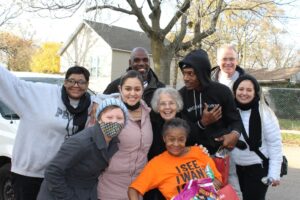
Raechel with members of the PBMR community
By Raechel Kiesel, Precious Blood Volunteer
One sunny Sunday in December, I found myself in the PBMR hallway watching my friend Essie teach the niece of one of the moms in our Families Forward program how to play a clapping game. It was similar to many of the patty-cake-like games I played as a little kid, but it wasn’t one I had seen before, so I soon turned to Sr. Carolyn, and we tried to clap along with Essie and our new friend. After many rounds of trying and failing, I ended up playing with the young girl. We had both improved just a little, so soon enough we were shouting together, “Right! Left! 1 Right! Left! 1 2 Right! Left! 1 2 3!” and clapping faster and faster, and when we finally made it to 5—which was a major feat, let me tell you—we jumped up and down and cheered. It was then that I remember watching out of the side of my eye as Fr. Kelly walked past us, narrowly avoiding contact with our flailing, clapping limbs, and I realized just how ridiculous I looked at that moment. Not only did I have reindeer antlers on my head, but I had been bent over playing patty cake with a little girl, laughing, shouting, raucous, and happy, in the middle of the hallway on a Sunday. It took me a while after that to realize that, actually, it wasn’t ridiculous at all—not for PBMR. Because that’s what we do here.
Read more of Raechel’s reflection at https://preciousbloodkc.org/receiving-welcome/
Learn more about Precious Blood Volunteers at preciousbloodvolunteers.org.
Mar 11, 2021
by Fr. Bill Nordenbrock, C.PP.S.
“So, what are you going to do for Lent?”
That is not a question that I hear as often these days, but there was a time when that was not an unusual conversation starter for Catholics as Lent approached. Sort of like asking someone if they made any New Year’s resolutions; it was an indicator that Catholics took seriously the possibility that Lent could be a time of renewal and personal transformation.
When I was younger, the answer that nearly everyone gave to that question was about making sacrifices and giving something up. Acts of penance are still part of the recommended observance, although often in current teaching the suggestion is that penance be combined with the giving of alms, transforming the foregoing of dessert from a mere diet into a religious observance.
Lent is also a liturgical season which has a particular invitation to reflect on reconciliation. Mostly, the concern is for sinners to be reconciled with God and not so much a concern for sinners to be reconciled with each other. In a ministry of reconciliation, it is important to maintain the connection between the two. One helpful image is found in the cross where both the horizontal and vertical dimensions are essential. When we link acts of penance with the giving of alms, we are making that connection. When we are motivated by a realization that our over consumption is at the expense of others, then penance and alms giving is act of solidarity with the poor and can be personally transforming.
For many, “going to confession” is also a part of the plan for Lent. We celebrate the sacrament, and we ask for a “fresh start,” with the hope that the grace of the sacrament will help us to overcome those sinful tendencies that have brought us to the sacrament. That sacrament takes on amplified meaning when the desire for forgiveness flows out of a sincere desire to be and live differently going forward. Then the sacrament can be a transforming act of grace.
The essential connection between horizontal and vertical dimensions of reconciliation are most clearly articulated in St. Paul’s words given to the community in Corinth.
This means that if anyone is in Christ, they are a new creation. The old order has passed away; now all is new! All this has been done by God, who has reconciled us to himself through Christ and has given us the ministry of reconciliation. I mean that God, in Christ, was reconciling the world to himself, not counting humankind’s transgression against them, and that he has entrusted the message of reconciliation to us. This makes us ambassadors for Christ, God as it were appealing through us. (2 Cor 5:17-20a)
Above all, we need to rejoice in the gift of reconciliation given to us, but like all gifts that God bestows on us, that gift becomes a commission. God makes “re-gifting” a command. St. Paul heard faithfully God’s command: I reconcile you and now you become my ambassador and spread this gift throughout the world. And St. Paul wanted his readers to know that they have been given the same gift and commission.
When I celebrate the sacrament of confession, as one confessing or as a confessor with others, I try to share the truth of reconciliation as both a gift and a commission. When we go to confession, we celebrate very well the first part, that God has forgiven us, but it takes a conscious effort to include the second part of the God’s work into the sacrament. As I leave the confession giving thanks to God for the sacrament, my thoughts should be: God has forgiven me – who do I need to forgive? God has reconciled me – where does God send me as an ambassador for Christ?
Precious Blood people should hear the invitation to reflect on reconciliation during Lent. Not just to come to a greater understanding of this aspect of our charism, but to allow our Lenten observances to help transform us into a reconciling presence. So as this season begins, the question to ask might be: How will Lent be a time when I journey deeper into our charism? How can Lent be a time to more fully embody our charism?
In the ministry of reconciliation, we have learned that an ambassador of Christ proclaiming the message of reconciliation must be radically hospitable and skillful in the practice of accompaniment.
Radical hospitality is about lovingly making room to receive people as they are, warts and all. Sometimes that is by offering a welcoming physical space, but in the ministry of reconciliation is it more often about creating the emotional space for people to be welcomed without judgement. Are we willing to welcome into our life and “space” those who are not like us? Can those of different ethnicity or nation of origin find in a us a place where they are safe and can be expressive of their cultural identity? Real hospitality is dependent on our willingness to see what is positive in the “other” and to welcome those differences, recognizing that their giftedness is a gift to us.
During this Lenten season, one sign of the times that demands to be noticed is that polarization is a dominant characteristic in U.S. culture. Seemingly, across the board from politics to religion, dialogue has been replaced by dueling position statements. Perhaps this Lent, as Precious Blood people, we can make a practice of not writing off another’s opinion until we know why they care about their opinion; until we know the value that they are protecting in their opinion. This will require that we are radically hospitable, making space for another by presuming that they are of good intentions and that they are guided by values, values that we may share even if we don’t share their opinion on the matter that is brought to the dialogue.
Lent is a time for renewal and reconciliation, where religious practice can help us to remember and respond to a call for personal transformation. How can your religious practices during this Lent cultivate within you the attitudes and skill that will make you a reconciling presence in the Church and the world?
[This article appeared in the New Wine Press, February 2008. Fr. Nordenbrock welcomes your comments and questions. He can be contacted at bill.nordenbrock@gmail.com]


 They appear in Jerusalem to get directions. When they arrive in Bethlehem, they give their gifts to Jesus and offer him homage. They renege on their promise to Herod after having dreams in which angels warn them Herod’s intentions are not good. They end up going home a different way. They are a group of people who appear quietly in Matthew’s Gospel, and after giving their gifts and offering homage to Jesus, they just as quietly disappear.
They appear in Jerusalem to get directions. When they arrive in Bethlehem, they give their gifts to Jesus and offer him homage. They renege on their promise to Herod after having dreams in which angels warn them Herod’s intentions are not good. They end up going home a different way. They are a group of people who appear quietly in Matthew’s Gospel, and after giving their gifts and offering homage to Jesus, they just as quietly disappear.


 by
by 